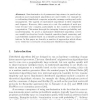Free Online Productivity Tools
i2Speak
i2Symbol
i2OCR
iTex2Img
iWeb2Print
iWeb2Shot
i2Type
iPdf2Split
iPdf2Merge
i2Bopomofo
i2Arabic
i2Style
i2Image
i2PDF
iLatex2Rtf
Sci2ools
109
click to vote
VOSS
2004
Springer
2004
Springer
Analysing Randomized Distributed Algorithms
Abstract. Randomization is of paramount importance in practical applications and randomized algorithms are used widely, for example in co-ordinating distributed computer networks, message routing and cache management. The appeal of randomized algorithms is their simplicity and elegance. However, this comes at a cost: the analysis of such systems become very complex, particularly in the context of distributed computation. This arises through the interplay between probability and nondeterminism. To prove a randomized distributed algorithm correct one usually involves two levels: classical, assertion-based reasoning, and a probabilistic analysis based on a suitable probability space on computations. In this paper we describe a number of approaches which allows us to verify the correctness of randomized distributed algorithms.
Distributed Computation | Mathematics | Randomized Algorithms | Randomized Distributed Algorithms | VOSS 2004 |
Related Content
| Added | 02 Jul 2010 |
| Updated | 02 Jul 2010 |
| Type | Conference |
| Year | 2004 |
| Where | VOSS |
| Authors | Gethin Norman |
Comments (0)

